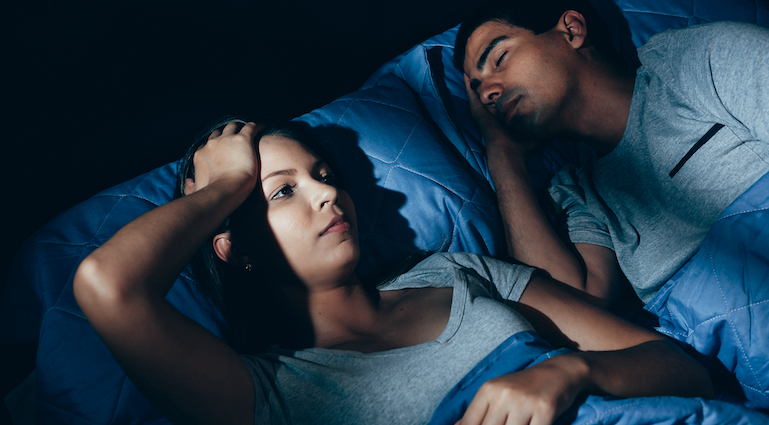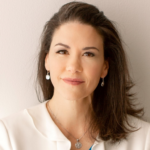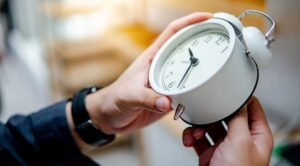The Sleep Gender Gap: Nighttime Disparities Between Women and Men

- U.S. adult women age 18 and older (33%) are more likely than men (27%) to wake up every night and more likely to stay up late every night (31% vs. 20%).
- More than half of women ages 25-44 with children get less than 7 hours of sleep per night, compared to 38% of men in this group.
- Men in this group also get 30 minutes more sleep per night than the women.
- Within this group, twice as many women are woken every night to care for others compared to men.
- Nearly a quarter of women ages 18-24 lose sleep due to premenstrual syndrome (PMS), while more than half of women ages 45-54 lose sleep due to perimenopause or menopause.
- Women (51%) are more likely than men (42%) to attribute their sleep issues to anxiety and depression.
“I cannot fall back asleep once someone wakes me up in the night, and the kids are always waking me up,” says Lauren Wellbank, a 42-year-old freelance writer in Lehigh Valley, Pennsylvania. “It’s been brutal, to the point where I’ve burst into tears after being woken up.”
A mother of three, she says her struggles are caused by both family dynamics and hormonal changes. “I had kids later in life, so I went from always being pregnant or breastfeeding for almost ten years to stopping both as I entered my forties,” she says. “I think my hormones took a major hit.”
Wellbank’s experience reflects a broader trend: American women don’t get enough sleep. In fact, almost half of women (49%) get less than the recommended 7 hours of sleep per night, compared to 41% of men, according to a February 2024 survey by Sleepfoundation.org. Women (33%) are more likely than men (27%) to wake up every night and also more likely to stay up late every night (31% vs. 20%). This is especially concerning given that research suggests women need moresleep than men.
As we celebrate Women’s History Month, we ask: What causes this sleep disparity? Experts say the reasons are both cultural and physiological.

Caregiving Costs Women Sleep
On a given day, men spend half as much time on caregiving responsibilities as women. So, it makes sense that sleep disparities are highest among people ages 25-44 with at least one child. Within this group, the majority of women (55%) get less than 7 hours of sleep per night, compared to 38% of men.
Men in this group also get 30 minutes more sleep per night. That may not seem like a big difference. But, research shows that extending overnight sleep by just over half an hour can reduce fatigue, tension, and daytime sleepiness, and even improve performance on cognitive tests.
Some 12% of women wake up every night to care for others, twice as many as men who report doing the same. All that responsibility can take a toll on mental health: women in this group are 9% more likely to lose sleep to caregiver worries and 13% more likely to lose sleep to household responsibilities than the men. Women with children are not only 3 times more likely than non-parents to lose sleep worrying about their responsibilities as caregivers, but they are also slightly more likely than menwithchildren to lose sleep due to these concerns.
Hormonal Changes Make Sleep Challenging
“Women go through hormonal changes cyclically or definitively with menopause that men don’t necessarily deal with,” says Dr. Alyssa Dweck, a gynecologist and Chief Medical Officer of Bonafide Health. And dramatic fluctuations in hormone levels often disrupt sleep.
“Before and during my period, I often experience heightened anxiety and mood swings, which can make it difficult for me to fall asleep and stay asleep throughout the night,” says Chelsey Borson, a 31-year-old mother of two in Los Angeles and founder of a child sleep consulting service.
According to the survey, more than one-third (37%) of women currently lose sleep due to a female hormone-related condition. Of those, nearly a quarter (23%) of 18-24 year olds lose sleep due to premenstrual syndrome (PMS). While this percentage drops to 12% among women 25-34, many women in this age group become pregnant, which can cause hormone and body changes that impact sleep. In this group, 10% say they currently lose sleep due to pregnancy.
By the time women reach the 45-54 age bracket, more than half of them (53%) are losing sleep to perimenopause and menopause, which is the stage when women stop having their periods. This phase entails major drops in certain hormone levels, resulting in symptoms like hot flashes and sleep disturbance. After age 54, 21% lose sleep to menopause.
Transgender women experience unique challenges, especially if they choose to undergo medical procedures, hormone therapy, or other treatments to change their physiology. “These are massive undertakings, and there are stressors associated that can impact sleep,” says Dr. Audrey Wells, a board-certified sleep medicine physician. These can include anxiety about their identity or worries about choosing gender-affirming therapy. “If there are hormonal treatments associated with the program, then those can induce sleep problems as well,” Dr. Wells says.
Stress and Anxiety Take Their Toll
Women often feel heavily burdened by social expectations and the responsibilities placed on them, says Dr. Wells.
“These invisible burdens can weigh on a woman’s mind and interrupt sleep because they generate emotions that are incompatible with sleep,” she says. “So they have difficulty getting to sleep or staying asleep at night. This is not as true for men in my experience, and it’s not really talked about in sleep medicine.”
Dr. Dweck agrees. “Women often complain of what you call the busy mind. They may not have any trouble falling asleep because they’re exhausted,” she says. “But many of them wake up at night and start to think about a laundry list of things on their to-do list or stressing them out. And that gives them a lot of trouble going back to sleep.”
According to the survey, women (51%) are more likely than men (42%) to attribute their sleep issues to anxiety and depression. While younger women are more likely to lose sleep worrying about their mental health, older women are more likely to lose sleep due to financial worries.
Women May Have Undiagnosed Sleep Apnea
Sleep apnea is often thought of as a man’s issue, but 1 in 4 women are at risk for this condition, which can cause pauses in breathing and disturbances during sleep. It’s estimated that as many as 90% of women with sleep apnea go undiagnosed.
“When a woman presents to a sleep clinic for an evaluation, her symptoms are not compatible or consistent with the stereotypical symptoms for conditions like sleep apnea,” says Dr. Wells.
Women don’t typically report sleepiness, meaning the propensity to fall asleep during the day. Rather, they’re more affected by tiredness, characterized by lacking energy.
“That, by itself, is problematic,” Dr. Wells says. “But it can also amplify symptoms of anxiety and depression or mood issues. So when a woman is describing this to a primary care doctor or sub specialist or even a sleep medicine doctor, it may be characterized as a mood issue.” As a result, they may not get appropriate care.
Finally, Dr. Wells says home sleep apnea tests can be misleading or inconclusive for women. Because sleep apnea manifests differently in women, such as morning headaches or mood changes rather than loud snoring, the tests are not always able to accurately measure the condition. That can make women think they’re fine and not follow up with a sleep lab study.
What Strategies Can Women Try to Get Better Sleep?
During this Women’s History Month, understanding the unique challenges that women face is a start to closing the sleep gender gap. But what specific strategies can women try to get sufficient quality rest?
Regardless of age or sex, reducing stress is a key component of quality sleep. That might include getting more frequent exercise, talking to a therapist to understand the roots of your stress, and practicing mindfulness and meditation. If you’re taking any medication, including hormonal treatments, consulting with a provider to determine the best time of day to take it can also lessen the impact on sleep.
For older women, managing symptoms of menopause or perimenopause is essential for better sleep. You can ask your doctor about medications or supplements. To prevent overheating at night, look into cooling mattresses and cooling sheets made of breathable fibers such as cotton.
Sharing a bed with a partner, kids, or pets could also lead to overheating and other issues. It could be worth separating during sleep. For those with nighttime caregiving responsibilities, you may need to experiment to figure out what works best for you. If you’re partnered, propose a shared schedule to lessen the impact on your sleep. If you’re single, try to recoup lost sleep in short bursts during the day or whenever those that you’re caring for are sleeping.
Jamie Beth Cohen, a 48-year-old writer and project manager in Lancaster, Pennsylvania, says that she finally cracked the code for herself after spending years waking one to three times per night. Now, she takes a common antidepressant to treat premenstrual dysphoric disorder (PMDD), a severe form of PMS that can cause extreme mood shifts, as well as a cannabidiol (CBD) supplement. “I’m having the best sleep of my life,” she says.
Methodology
The survey commissioned by SleepFoundation.org was conducted on the online survey platform Pollfish in February 2024. Results are from 1,000 survey participants in the United States who were ages 18 and older at the time of the survey. All respondents attested to answering the survey questions truthfully and accurately.
Got a hot tip? Pitch us your story idea, share your expertise with SleepFoundation.org, or let us know about your sleep experiences right here.
References
7 Sources
-
Consensus Conference Panel, Watson, N. F., Badr, M. S., Belenky, G., Bliwise, D. L., Buxton, O. M., Buysse, D., Dinges, D. F., Gangwisch, J., Grandner, M. A., Kushida, C., Malhotra, R. K., Martin, J. L., Patel, S. R., Quan, S. F., Tasali, E., Non-Participating Observers, Twery, M., Croft, J. B., Maher, E., … Heald, J. L. (2015). Recommended amount of sleep for a healthy adult: A joint consensus statement of the American Academy of Sleep Medicine and Sleep Research Society. Journal of Clinical Sleep Medicine, 11(6), 591–592.
https://pubmed.ncbi.nlm.nih.gov/25979105/ -
Bureau of Labor Statistics. (2023, June 22). American Time Use Survey summary [Economic News Release]., Retrieved February 28, 2024 from
https://www.bls.gov/news.release/atus.nr0.htm -
American Academy of Sleep Medicine. (2017, June 5). Sleep extension improves response time, reduces fatigue in professional baseball players. ScienceDaily., Retrieved February 28, 2024, from
http://www.sciencedaily.com/releases/2017/06/170605085329.htm -
Harry-Hernandez, S., Reisner, S. L., Schrimshaw, E. W., Radix, A., Mallick, R., Callander, D., Suarez, L., Dubin, S., Khan, A., & Duncan, D. T. (2020). Gender Dysphoria, Mental Health, and Poor Sleep Health Among Transgender and Gender Nonbinary Individuals: A Qualitative Study in New York City. Transgender health, 5(1), 59–68.
https://pubmed.ncbi.nlm.nih.gov/32322689/ -
Kapsimalis, F., & Kryger, M. (2009). Sleep breathing disorders in the U.S. female population. Journal of women’s health (2002), 18(8), 1211–1219.
https://pubmed.ncbi.nlm.nih.gov/19627224/ -
Young, T., Evans, L., Finn, L., & Palta, M. (1997). Estimation of the clinically diagnosed proportion of sleep apnea syndrome in middle-aged men and women. Sleep, 20(9), 705–706.
https://pubmed.ncbi.nlm.nih.gov/9406321/ -
Kapur, V. K., Auckley, D. H., Chowdhuri, S., Kuhlmann, D. C., Mehra, R., Ramar, K., & Harrod, C. G. (2017). Clinical Practice Guideline for Diagnostic Testing for Adult Obstructive Sleep Apnea: An American Academy of Sleep Medicine Clinical Practice Guideline. Journal of clinical sleep medicine : JCSM : official publication of the American Academy of Sleep Medicine, 13(3), 479–504.
https://pubmed.ncbi.nlm.nih.gov/28162150/













































































